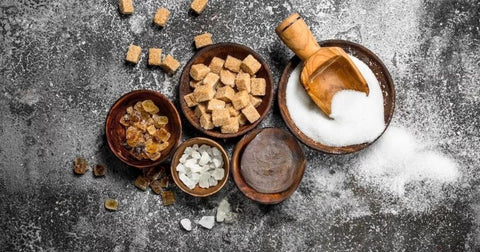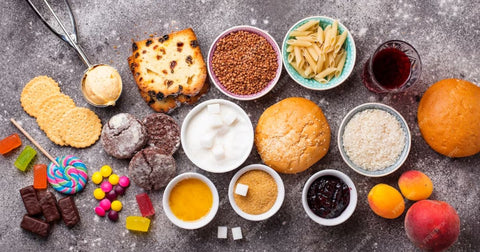Sugar has been the “sweet” constituent of our diet since the beginning of time. This sweetness is also something that businesses have capitalized on and built brands packaging and repackaging naturally derived substances. However, did you know that all sugars are not natural sweeteners?
The distinction between sugars has more to do with your health than with taste. Contrary to all the myths discrediting natural sugar for its health benefits, refined sugar does more harm than good to your health. Due to its bad carbohydrate and "zero" calorie properties, refined sugar often leads to weight gain, skin aging, a fatty liver, and even diabetes and chronic inflammation.
Hence, it makes it even more important to be aware of the different types of sugar so that, when you’re choosing a diabetic-friendly sugar partner for your diet, you make an informed choice.
In this article, we’ll look at:
- Natural and Refined: Two Different Types of Sugar
- Benefits of using Natural Sugar over Refined Sugar
- Guud Sugar: Your Best Natural Sugar Source
- Frequently Asked Question
So let’s begin-
Natural and Refined: Two Different Types of Sugar
Speaking of broad distinctions, it's essential to understand that refined sugar is the crystallized, processed version of natural raw sugar, which is abundant in many natural by-products. However, if we delve into specifics, we find significant differences between various types of natural and refined sugars. Let's take a closer look at the distinct varieties of both natural and refined sugars.
Types of Natural Sugar

1. Glucose: Found in fruits, vegetables, and honey, glucose serves as your body's preferred fuel source, powering all important bodily functions. This efficient energy molecule readily enters your cells and fuels vital processes like muscle contraction, brain activity, and organ function. Glucose can also function in the body as a natural way to lower blood sugar levels.
2. Fructose: Fruits and honey have concentrated amounts of fructose, a sugar that quickly boosts energy levels and is ideal for supporting physical and mental activities. Importantly, fructose works best alongside fiber and other nutrients found in whole fruits, promoting sustained energy and overall well-being.
3. Galactose: Dairy products usually contain galactose, which in turn contributes to the formation of lactose, the main sugar in milk. This sugar supplies essential nutrients for young children, supporting their well-being and growth. Additionally, galactose plays a role in the development of the nervous system and brain function in infants.
4. Lactose: Essential for early growth and well-being, lactose occurs naturally in milk and dairy, provides readily available energy, and contributes to the development of important gut bacteria and improved gut health. Also, it aids in the absorption of calcium and other minerals, promoting good bone health. Lactose, in moderate consumption, also acts as one of the best natural sweeteners for diabetes control.
5. Maltose: Grains contain maltose, a sugar that swiftly breaks down to glucose, supporting both digestive activity and the body’s overall energy production. Additionally, maltose plays a crucial role in the fermentation process of bread, contributing to its unique flavor and texture.
Types of Refined Sugar

1. White sugar: Also known as sucrose, white sugar is a refined sugar commonly used in cooking and baking. It’s derived from either sugar cane or sugar beets and works as a quick source of energy. Its fine granules make it highly soluble, making it suitable for sweetening beverages and creating dessert textures.
2. Brown sugar: Brown sugar is a type of sugar with a distinctive brown color due to the presence of molasses. It's prepared by infusing white sugar with molasses, giving it a caramel taste and a mushy, clumpy texture. It is frequently used for baking and cooking.
3. Ultrafine sugar: Ultrafine sugar, also known as caster sugar or bar sugar, is a type of granulated sugar that has a powdery texture. This fine texture allows it to dissolve more quickly than regular granulated sugar, making it ideal for delicate or smooth desserts such as mousse or puddings. It's also popular among servers since it dissolves quickly in cold drinks.
4. Sugar Cubes: They are compact blocks of granulated sugar, traditionally shaped into small cubes. They dissolve easily in beverages, offering a convenient way to sweeten your tea or coffee with a consistent amount of sugar every time. Despite their convenience, excess handling may cause them to break or crumble at the edges.
5. High-Fructose Corn Syrup (HFCS): It is a sweetener made from corn starch. It’s produced by breaking down the starch into glucose and then converting some of this glucose into fructose. There are two main types of HFCS: HFCS 42 and HFCS 55. The numbers tell us how much fructose is in them. HFCS 42 is mostly used in foods like cereal, while HFCS 55 is used in soft drinks.
You May Also Like to Know: 10 Health Risks of Refined Sugar You Must Know Before Getting Too Late!
Benefits of using natural sugar over refined sugar
Till now, we’ve just discussed the different characteristics of how many different types of sugar there are. Next, we’ll take you through the different values that make natural sugar beneficial to your health in comparison with refined sugar. Here are the five advantages of natural sugar over refined sugar:
1. Nutritional Value: Natural sugars, unlike processed sugars, retain their nutritional worth while also containing other helpful components. They retain their original composition, including the goodness of essential vitamins, minerals, and dietary fiber.
2. Digestion: Unrefined sugars are absorbed gradually, helping maintain your overall metabolic balance. This is because foods packed with protein or high in fiber assist your body in metabolizing these sugars in a more controlled manner.
3. Blood Sugar Levels: Whole sugars prevent sharp blood sugar swings that contribute to fat accumulation, insulin resistance, and diabetes. This is because foods with unrefined sugars contain other components, like fiber, that moderate the pace of sugar absorption. Choosing whole foods rich in natural sugars is a delicious and natural way to lower blood sugar spikes and support overall health.
4. Whole Foods: Unprocessed sugars are predominantly present in whole foods, teeming with essential nutrients and health-promoting elements. Integrating these foods into a diverse diet ensures you receive the full spectrum of vital substances your body needs.
5. Blood Glucose Levels: Fruits and dairy products have fructose and lactose that are processed more slowly, ensuring your blood glucose level stays elevated for a longer period.
But you might wonder, which could be your best natural sugar source so that you maintain such healthy body habits?
Guud Sugar: Your Best Natural Sugar Source
“Guud” sugar is a natural sugar source for you, offering a healthier alternative to refined sugar. Packed with ancient Ayurvedic herbs and plants, “Guud” boosts your defenses and helps your body handle sugar better. Get the delicious sweetness you crave in a sugar substitute for diabetes control with "Guud," your smart mix of old wisdom and new science.
Did this solve your query? If yes, then check out the ‘Guudness’ of Guud sugar on the official website. Guud products are also available on Amazon and Flipkart.
